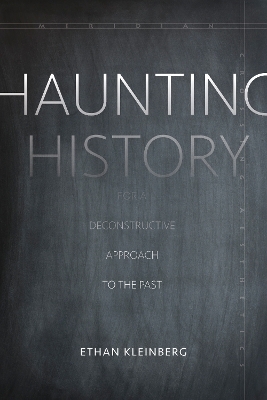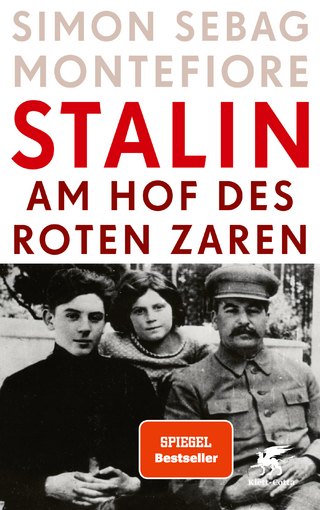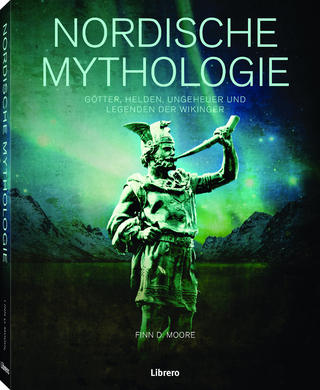
Haunting History
Stanford University Press (Verlag)
978-1-5036-0237-3 (ISBN)
This book argues for a deconstructive approach to the practice and writing of history at a moment when available forms for writing and publishing history are undergoing radical transformation. To do so, it explores the legacy and impact of deconstruction on American historical work; the current fetishization of lived experience, materialism, and the "real;" new trends in philosophy of history; and the persistence of ontological realism as the dominant mode of thought for conventional historians.
Arguing that this ontological realist mode of thinking is reinforced by current analog publishing practices, Ethan Kleinberg advocates for a hauntological approach to history that follows the work of Jacques Derrida and embraces a past that is at once present and absent, available and restricted, rather than a fixed and static snapshot of a moment in time. This polysemic understanding of the past as multiple and conflicting, he maintains, is what makes the deconstructive approach to the past particularly well suited to new digital forms of historical writing and presentation.
Ethan Kleinberg is Professor of History and Letters at Wesleyan University and the author of Generation Existential: Heidegger's Philosophy in France, 1927–1961 (2005).
Contents and AbstractsIntroduction: Introduction chapter abstractThe introduction provides an overview of the books general argument by defining "ontological realism" as the dominant more of conventional historical practice and then offering a deconstructive approach to the past as a more productive alternative. For the most part, Derrida's engagement with the question of "history" did not address the practices of working historians so Kleinberg looks to the places where this is explicit such as Derrida's Archive Fever. In so doing he lays out the argument that will follow in the book and advocates for an unsettling of the orderly boundaries and lines by which we conventionally think about the relation between past and present and thus the way we "do" history.
1Haunting History chapter abstractChapter One, "Haunting History," provides an intellectual history of the reception of deconstruction in the American historical profession by means of a ghost story. Deconstruction is described as akin to the ghost both because while it has been repeatedly targeted in attacks against the dangers of postmodernism, poststructuralism, or the "linguistic turn," very few historians actively use deconstruction as a historical methodology; in this regard the target has always been a phantom. But also because of the ways that deconstruction itself haunts disciplinary history exposing the axiomatic assumptions of conventional historians and revealing the complex nature of our relationship with the past.
2Presence in Absentia chapter abstractChapter Two extend the discussion in Chapter One to explore the recent trend in philosophy of history known as "Presence." Utilizing the ghost of Christmas present in Charles Dickens' A Christmas Carol, Kleinberg explores the work of Eelco Runia, Hans-Ulrich Gumbrecht, and Frank Ankersmit to reveal the limitations of the Presence model and its affinities to conventional ontological realist history.
3Chladenius, Droysen, Dilthey: Back to Where We've Never Been chapter abstractChapter Three looks to the German historicist tradition and the figures of Johann Martin Chladenius (1710-1759), Johann Gustav Droysen (1808-1884), and Wilhelm Dilthey (1833-1911) to determine its relation to "ontological realism" and to expose the limitations of that model in our current intellectual milieu. It is argued that a closer look at these three thinkers sheds light on the utility of a deconstructive, hauntological, approach to the past that is guided by, though not beholden to, Derrida.
4The Analog Ceiling chapter abstractChapter Four argues that the dominance of ontological realism in the historical profession is no longer justifiable based on our current understanding of the past but is nevertheless supported by our current scholarly publishing practices. What Kleinberg calls the "analog ceiling" functions because it allows one to argue that even though the past may not really correlate to the narrative reconstructions of ontological realism, this form is nevertheless the best analogy to make the past intelligible, understandable, and comprehensible. To counter this model Kleinberg looks to current innovations in digital scholarship and the ways that a deconstructive approach to the past enable us to innovate and reimagine how history can be done. It argues that academic research and publishing as we know it are changing in ways that will alter how we think and write about the past, and as a result the discipline of history.
5Past Possible and Possible Pasts chapter abstractThe final fifth chapter, concludes by offering a deconstructive approach to the past as a theory of and methodology for history. Using Washington Irving's Legend of Sleepy Hollow, Kleinberg explains how a hauntological approach to history that embraces what he calls the past that is (present and absent) rather than a fixed and static snapshot of a moment in time is able to account for the enigma of a past that is both here and gone. The past, like the ghost, does not properly belong to the present but neither does it remain entirely in the past, it begins by coming back.
| Erscheinungsdatum | 28.09.2017 |
|---|---|
| Reihe/Serie | Meridian: Crossing Aesthetics |
| Verlagsort | Palo Alto |
| Sprache | englisch |
| Maße | 152 x 229 mm |
| Themenwelt | Geisteswissenschaften ► Geschichte ► Allgemeines / Lexika |
| Geisteswissenschaften ► Philosophie | |
| Geisteswissenschaften ► Sprach- / Literaturwissenschaft ► Anglistik / Amerikanistik | |
| ISBN-10 | 1-5036-0237-0 / 1503602370 |
| ISBN-13 | 978-1-5036-0237-3 / 9781503602373 |
| Zustand | Neuware |
| Haben Sie eine Frage zum Produkt? |
aus dem Bereich


